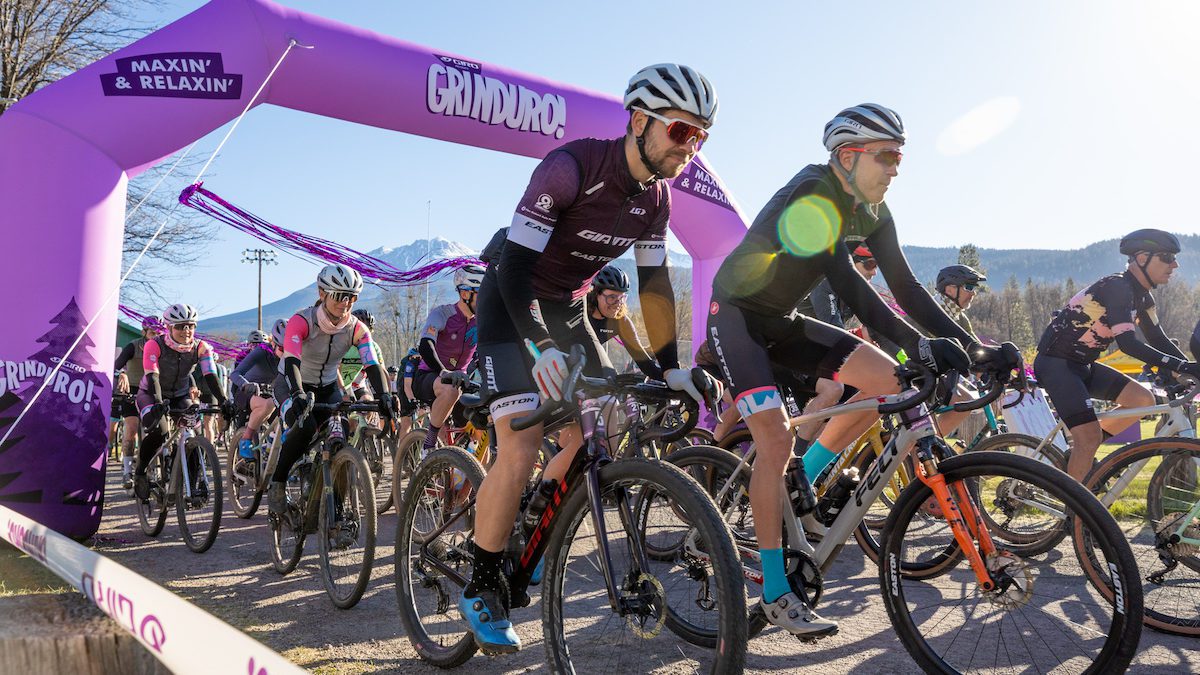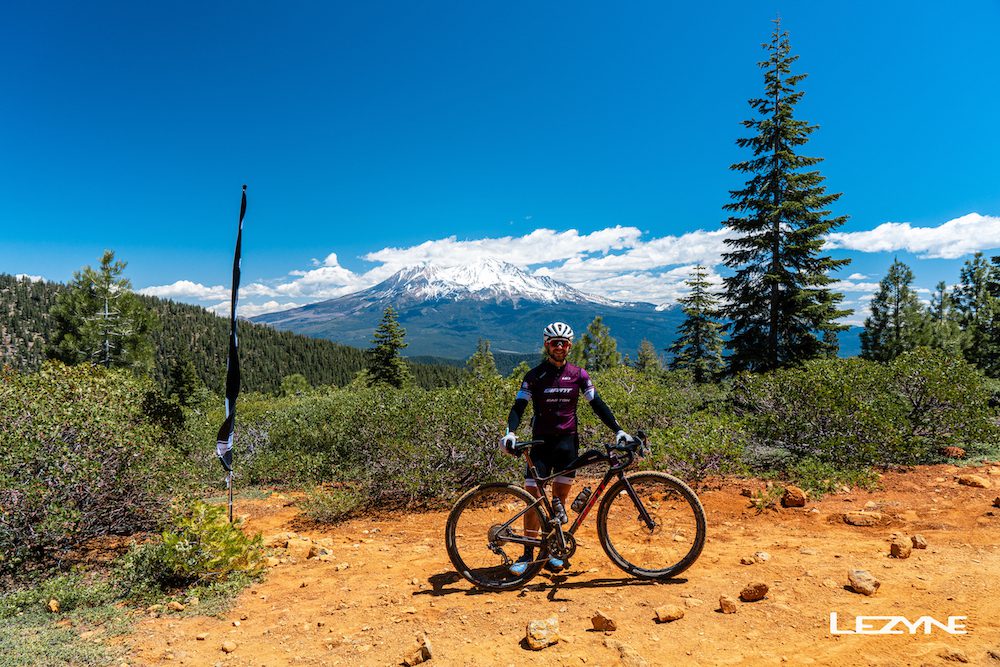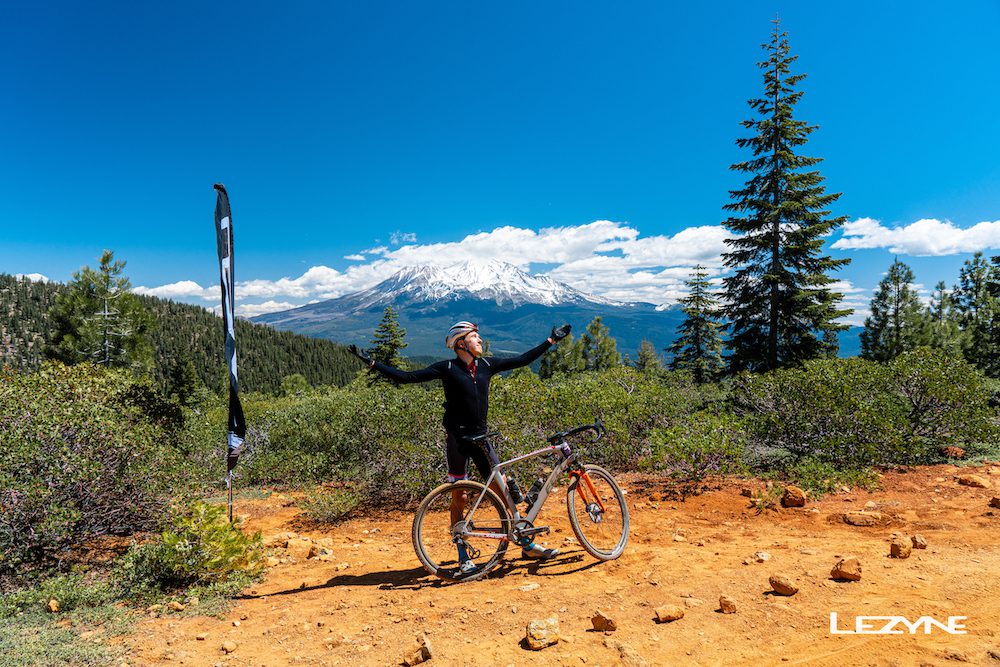Interview: Michael van den Ham on winning Grinduro and the ‘spirit of gravel’
Fun and fast in the shadow of Mount Shasta
 Photo by:
Elliot Layda / Grinduro
Photo by:
Elliot Layda / Grinduro
On Sunday, when most Canadians were relaxing and enjoying a long weekend, Michael van den Ham was winning races. The Chilliwack, B.C., cyclocross racer headed to California for the Grinduro gravel event. Van den Ham not only landed the win but was joined on the podium by fellow Canuck, Rob Britton.
Grinduro is one of gravel racing’s more distinctive formats, borrowing from the “enduro” format in mountain biking. Instead of a start line and a finish line, there are multiple timed stage are interspersed with neutral, non-timed sections. Like a mini stage race that happens over one day, the times from each stage are added together to determine the winner. In mountain bike enduros, its the descents that are timed. For Grinduro, the stages balance different aspects of gravel. There’s a climb, a singletrack section, a rolling stage and a gravel descent. It gives the event a unique flavour, which is part of what drew van den Ham to the event in the first place.
We caught up with van den Ham back at home in Chilliwack to talk about his Grinduro win, how he sets his gravel race calendar to mix fast and fun, why mountain biking could be the key to going faster and why he won’t be going to Unbound this year.

Canadian Cycling Magazine: You’ve changed your race program up a bit this summer. What attracted you to the Grinduro race?
Michael van den Ham: It’s kind of a long story. I have done a Grinduro before in Quebec back in 2019. I felt like it was one of the more fun gravel racing formats I’ve done. One of the thing’s I’ve always thought gravel was supposed to be about – and take that with a grain of salt, everyone has a different opinion on that – was being able to ride and hang out with your friends and have a good time.
Two gravel experts on racing, gear and tips for big days on rough roads
I felt like that Grinduro format with its timed stages encapsulated that. What drove that home was that I was riding with a few friends and one of them flatted during a neutral non-timed section. We were able to stop, help them fix that and wait for them. That’s not something you would do in a gravel race normally. Someone flats, and it’s like “too bad, see you at the finish line.”
Part of it is because that kind of effort suits a cyclocross rider, so I was good at it. But I also like the idea of doing a ride that was social, enjoyable and you get to stop at aid stations, but you still get to race really hard.
Gravel events are quite diverse now, there are so many very different events that fall under the gravel umbrella. How do you balance training, race goals, and just enjoyment of races when you’re putting together your summer calendar?
That’s a great question. For me, I love ‘cross season. That’s why I race. But it’s also serious business. So with gravel, being able to go places I haven’t been before, do races I haven’t done before, and enjoy not just the race itself, but the place I’m going lets me make the most of it.
At the end of the day, I’m still a cyclocross racer. Every gravel event that I choose to do, that’s in the back – or forefront – of mind. I’m trying to do well at these, but I’m doing them with cyclocross season in mind. I’m doing them to train for that, to put myself in the best position I can for ‘cross season.
It’s one of the reasons I’m not doing Unbound, for example. It’s too long, and it’s not compatible with my training. Doing a lot of these rides that are more like four, five or six hours fits in more with my build. They resemble a Spring Classic more closely. Or, in the case of Grinduro, a hard 5 hour endurance ride with VO2 efforts in it. I can fit that in no problem. It’s helping me get to another goal, and it’s something I enjoy doing.
How did the actual race day play out for you at Grinduro go?
It went great. I figured my biggest competition would be Rob Britton. That ended up being pretty close to true, he was third. And – I should preface this by saying Rob’s actually a really good descender, this isn’t a slight – but I figured I’d have an edge on him in the technical stuff and he’s have an edge on me, with his road pedigree, on the more pedalling-based sections.
Honestly, that’s how it ended up playing out. We spent a good chunk of the day riding together, so we had a decent idea where the other person was. I got him on the first stage, which was a climbing stage. And the second stage, the singletrack stage. And I think he took it to me on the rolling time trial style stage. But I had enough of a gap by that point, that I could take the overall over him.
So it worked out. That said, these are all 10-minute efforts. I think they play out into my strengths as a cross racer. That’s maybe what I’m best at, that 10-20 minute effort. Whereas, at this point, in an eight-hour race, Rob is a far better racer than I am. I don’t stand a chance against him.

You and Britton are quite different riders, but you were both on the podium. Is there something about Grinduro suits Canadian riders, or B.C. riders? Or did Grinduro just match your personal strengths well?
I think what you could say about both of us, even though were very different riders, is that we can both do a bit of everything. Even though Rob has a long history as a road racer, he’s actually a solid mountain biker as well. We were talking about him racing mountain biking in the late ‘90s, that’s how he got into the sport.
Rob had a really good XC at Sea Otter. He actually has a really well rounded skill set and he’s spent tons of time doing these really big bike packing trips on different terrain. Sometimes people think a person is a road racer so they won’t have off-road skills. Maybe that’s true in some cases, but it’s not true of Rob.
INTERVIEW: Rob Britton’s transition from pro road to mountain bike and gravel racing
I would say the same for most cross racers. I think they generally have a well-rounded skill set. Look at Wout [van Aert] or [Mathieu] van der Poel or [Tom] Pidcock and you can see that at the highest level of the sport. Just the way we train and ride bikes all over the place, you have to be pretty good at lots of different things, you have to be pretty good at that.
And Pidcock and van der Poel also race mountain bikes, like you and Britton do now in the off-season.
Yeah, and I probably spend the most days on the mountain bike of any bike I ride. Just where I live and, even though I’m not doing a ton of mountain bike races, it’s too much fun not to ride your mountain bike a lot.
Do you think mixing up types of riding is important? For athletes at your level, but also for any rider looking to improve on bikes?
I think being able to ride lots of different bikes, having a degree of comfort in all sorts of different situations, is important.
One of the things I found when I started mountain biking more is that, as far as your technical reactions to things, it’s a faster sport than cyclocross is. You’re making reaction time decisions much more quickly, at 35 km/h instead of 25 km/h. That forced me out of my comfort zone. I think it pays dividends when you get to ‘cross season.
The other important thing is that mountain biking is fun, or at least I find it fun. It’s a long season, right? So if I’m on my bike 600 or 700 or 800 hours a year, it’s really important for me to be able to mix it up and do something that excites me. At this time of year, when the trails are starting to be really great, that’s mountain biking. That keeps the road biking I’m going to be doing in July, August, September and onward a little more fresh than being bored or tired of it already by then.
What’s next on the calendar for you, then?
Next up I have Lost and Found. That’s the same weekend as Unbound. It’s actually in a similar region to Grinduro, in the Sierra Buttes on the Nevada/California border. It’s a 100km gravel race in a really beautiful area.
I would say it’s the alternative to Unbound. As my former teammate Amity [Rockwell] has said a couple times, one of the biggest injustices in gravel is that Lost & Found and Unbound are on the same weekend. It’s just a really fun weekend. I always joke that we ride around Lost and Found and you run into people that have done Unbound and you look at each other and say, “aren’t you glad you’re not doing Unbound right now?” with a laugh, then keep racing.
RELATED: Lost and Found gravel builds back from devastating Dixie Fire
